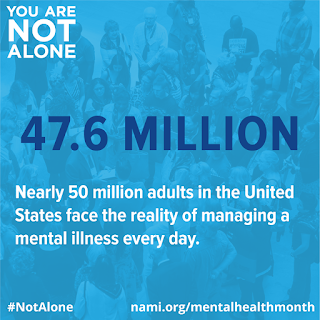As of May 8, 2020, 1,252,563 Americans have contracted the coronavirus, and 75,340 people have died. The numbers will continue to rise, and there is a growing concern about the impact that the pandemic is having on our mental health.
Uncertainty is on the minds of most Americans. With more than 33 million people out of work and having no way of knowing when life will return to normal, it is exceptionally stressful. Fears of contracting COVID-19 if we reopen the economy too quickly are affecting millions of Americans.
Those who already struggled with depression, anxiety, and post-traumatic stress disorder before the pandemic find social distancing and sheltering in place an exceptional burden. Some 20 percent have a form of depression in the United States. Everyone is facing some anxiety from uncertainty. Around 25 percent of Americans deal with some type of anxiety, according to PBS NewsHour. Men and women with depression and anxiety are incredibly vulnerable at this time.
Mental Health Awareness Month
Symptoms of mental health disorders are triggered by stress. The Centers for Disease Control and Prevention (CDC) offers some tips for dealing with the COVID-19-related stress:
- PAUSE breathe and notice how you feel.
- MAKE TIME to sleep and exercise.
- REACH OUT and stay connected.
- SEEK HELP if overwhelmed or unsafe.
It’s fortuitous that May is Mental Health Awareness Month, which is also referred to as Mental Health Month. The observance is about addressing the stigma of mental health disorders and providing support to the one in five adults who are living with mental illness, according to the National Alliance on Mental Illness (NAMI). The organization writes:
NAMI’s “You are Not Alone” campaign features the lived experience of people affected by mental illness to fight stigma, inspire others and educate the broader public. Now more than ever before, it is important for the mental health community to come together and show the world that no one should ever feel alone. The campaign builds connection and increases awareness with the digital tools that make connection possible during a climate of physical distancing. Even in times of uncertainty, the NAMI community is always here, reminding everyone that you are not alone.
NAMI also asks people living with mental illness to share their stories and spread graphics on social media. The former reminds those who are struggling that they are not alone; the latter helps raise awareness about the nearly 50 million Americans living with mental health disorders.
Taking Care of Your Mental Health
PBS NewsHour enlisted the help of a psychiatrist to help answer viewer questions about coping with stress, anxiety, loneliness, and depression. Please take a moment to learn more about how COVID-19 is affecting our mental health.
Dr. Jessi Gold, a Psychiatrist at Washington University School of Medicine in Saint Louis, answers viewer questions on how to take care of our mental health and cope with things like fear and anxiety during the COVID-19 pandemic:
If you are having trouble watching, please click here.
Addiction and Co-Occurring Mental Health Disorder Treatment
Many of the 47.6 million Americans struggling with mental health disorders are also contending with co-occurring alcohol or substance use disorders. If you are facing the challenge of addiction and co-occurring mental illness, then please reach out to Hope By The Sea.
Our team of highly trained professionals can help you heal and begin the journey of recovery during these challenging times. Hope Starts Here!


